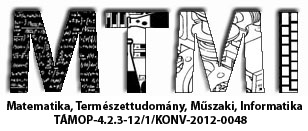Phagocytosis in MCF-7 cells and effect of the estrogen
Előadás adatai
PHAGOCYTOSIS AND EFFECT OF THE ESTROGEN
The estradiol which is a steroid hormone shows an important role in the progression of breast cancerEstrogen signalling is mediated through binding and activation of intracellular receptors ERα and ERβ that belong to the nuclear receptor (NR) subfamily of transcription factors. Estrogen and ERs regulate many biological processes such as differentation, growth and homestasis of different tissues. Ligand dependent ERs bind to estrogen and exert their effects either directly binding to consensus DNA sequences (ERE) or through protein- protein interactions to recruit on these sequences. Phagocytosis is a process in which cells ingest or engulf other cells or particles. Phagocytosis of extracellular matrix, especially degradation of collagen is an important for cancer cell invasion. Previous workings in our laboratary showed that some genes which are responsible for phagocytosis have estrogen response element such as vav 2 guanine nucleotide exchange factor, vav 3 guanine nucleotide exchange factor, Fc fragment of IgG, low affinity IIb, receptor(CD32), Fc fragment of IgG, low affinity IIIa, receptor (CD16a). Fcγ Receptor mediated phagocytosis is initiated by the activation of receptors which leads activation of VAV family. VAV1, VAV2 and VAV,3 activate Rho GTPases(Rac, Rho, Rho G, and Cdc 42) through Exchange of GDP for GTP and cause actin polymerizatin and formation of phagosome. To understand estrogen effects on phagocytosis in MCF-7 cells, I have tested estrogen dependence of members of the Vav family.
Zuhal Eraslan
Támogatók: Támogatók: Az NTP-TDK-14-0007 számú, A Debreceni Egyetem ÁOK TDK tevékenység népszerűsítése helyi konferencia keretében, az NTP-TDK-14-0006 számú, A Debreceni Egyetem Népegészségügyi Karán folyó Tudományos Diákköri kutatások támogatása, NTP-HHTDK-15-0011-es A Debreceni Egyetem ÁOK TDK tevékenység népszerűsítése 2016. évi helyi konferencia keretében, valamint a NTP-HHTDK-15-0057-es számú, A Debreceni Egyetem Népegészségügyi Karán folyó Tudományos Diákköri kutatások támogatása című pályázatokhoz kapcsolódóan az Emberi Erőforrás Támogatáskezelő, az Emberi Erőforrások Minisztériuma, az Oktatáskutató és Fejlesztő Intézet és a Nemzeti Tehetség Program



